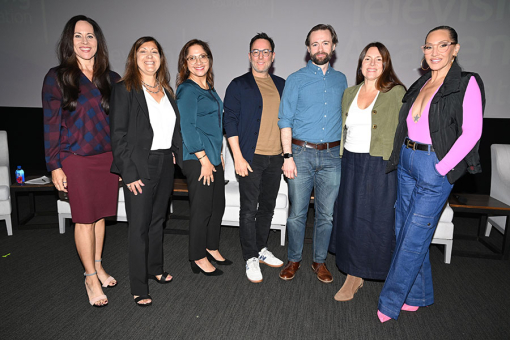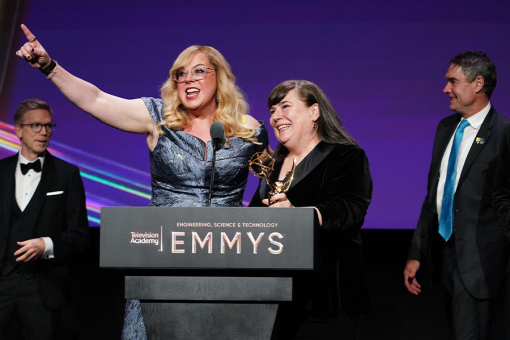This year marked the Television Academy's 15th annual Prime/Cuts event, a public panel discussion by Emmy-winning and Emmy-nominated picture editors about their art and craft of storytelling. This year's Prime/Cuts also marked a first: all six of the editors were women.
"The Academy's Picture Editors Peer Group Executive Committee picked the panelists based on the shows we thought were interesting. After we had picked four panelists, we noticed they were all women, so we thought we would continue the trend for the other two panelists," explained peer group governor Scott Boyd, ACE, who hosted the event with fellow governor Michael Ruscio, ACE. "There are no hard and fast rules for Prime/Cuts, other than to make it interesting and entertaining, and I think we accomplished that."
Indeed, they did. Virtual this year, as last, because of Covid, the event was held October 2 and is available for replay at Emmys.com.
On the panel were 2021 Emmy winners Stephanie Filo, ACE, A Black Lady Sketch Show, HBO, and Michelle Tesoro, ACE, The Queen's Gambit, Netflix; and 2021 nominees Amy Duddleston, ACE, Mare of Easttown, HBO; Sue Federman, ACE, Man with a Plan, CBS, a three-time Emmy winner for How I Met Your Mother; Nona Khodai, ACE, WandaVision, Disney+; and Susan Vaill, ACE, Hacks, HBO Max. Shawn Ryan, executive producer-showrunner of CBS's S.W.A.T., returned as moderator.
Television's wide range of material and visual setups — comedy, drama, variety, single-camera, multi-camera — meant that each editor had her own unique set of considerations.
Filo, for instance, edited the equivalent of 45 short films over the course of the season for A Black Lady Sketch Show. "You would walk in and it's, 'Today you're doing a horror sketch,' or 'Today you're doing a Biblical sketch,' or 'Today, it's an apocalypse sketch,'" she recounted. "So, you have to be able to think on your toes and work through the material really quickly."
When she had advance notice of a sketch, she would often watch a program in that genre beforehand and make note of elements common to that type of material.
There's a lot of cast improvisation in the sketches; Filo builds from a take of the scripted version and cuts in the best improv moments. "One of the first things [creator-showrunner-star] Robin Thede said to me was, 'It doesn't matter what's in there, as long as it's the funniest it can be. Only present something that's hilarious to me, so that we can do our notes together and make it as funny as possible,'" she said.
The win by the Black Lady Sketch Show editing team — including supervising editor Daysha Broadway and editor Jessica Hernández — marked the first time in Emmy history that a team comprised of women of color triumphed in the Outstanding Picture Editing for Variety Programming category. The off-camera diversity is advantageous.
"Our entire post team is made up of women and non-binary people," Filo said. "It's important to let us tell these stories, because we have this sort of nuance and background that makes it a lot easier to approach these stories. As editors, our job is to tell stories, and I think our responsibility is to tell those stories authentically. I don't know how else you can tell a story authentically, without having a diverse realm of perspectives behind the scenes.
"And it makes collaborating so much easier because you have a shorthand. It's a very special experience to be on a team like that."
Like Filo, Tesoro scored a win on her very first nomination, for Outstanding Single-Camera Picture Editing for a Limited or Anthology Series or Movie. Having previously worked on the first version of the therapy-themed HBO drama In Treatment, in which scenes featured two people sitting and speaking across from each other, she was well prepared for the chess-match scenes in The Queen's Gambit.
"You have to figure out how to make it compelling," she said. "When I approached the material for those sections, I felt like, 'Well, there's a lot more here visually than just two people talking, so if I can make that work ... I think this is a little bit easier because you have chess pieces. you have a sequence to it, there's a clock, there are people standing around reacting to it. It's not just the [players'] reactions to each other and what the chess pieces were; you can feel the audience behind them.
"So it's using elements that may not seem like very much to their maximum effect."
Some sections of the script were open to editorial interpretation. "Sometimes you'll see one line in the script: it's not dialogue, it's, 'And then they play the game,'" Tesoro said. "We actually have no idea how long that's going to be, but when I was reading it, it felt like it was going to go at a certain pace, at a very rhythmic and 'clippy' pace."
In some chess scenes, music heightened the pace. For Federman, music is personally integral to her work: she was a violinist for many years in orchestras in Honolulu and San Francisco but didn't like the pressures of performing and found a creative outlet in editing.
"Music is so important in editing," she said. "It's all rhythm, obviously, in timing and structure, and understanding where the moments are, within a piece or within a show or within a story."
Federman's Man with a Plan nomination was for Outstanding Multi-Camera Picture Editing for a Comedy Series; How I Met Your Mother, for which she won her three Emmys, of six additional nominations, was also a multi-cam comedy.
Man with a Plan films before a studio audience; Mother did not, a trend which has increased over the years. "I'm doing How I Met Your Father [for Hulu] now, with no audience, which is much more complicated, story wise and camera wise and in every way," she said. "Those shows are more hybrids. I think people are trying to be more ambitious these days, doing more dynamic storytelling using flashbacks and fantasies, the cool stuff that we see all the time now."
As a comedy veteran, Federman said she enjoyed WandaVision, a take-off on classic sitcoms that itself is a hybrid between sitcom and the Marvel Cinematic Universe superhero realm. Khodai received nominations for two episodes of the show, in the Outstanding Single-Camera Picture Editing for a Limited or Anthology Series or Movie category.
Because the show re-created the styles of various shows, it was helpful to have grown up watching such comedies as Family Ties, Growing Pains and reruns of I Love Lucy and The Brady Bunch, but Khodai's editing background is in drama and sci-fi, a benefit for the MCU aspects. Other show editors had a range of backgrounds; all collaborated to make the disparate elements seamless and figure out which laugh track to use for which scenes.
In editing, "The transitions were the most difficult thing, going from the sitcom to the MCU, and figuring out how to transition between them," Khodai said. "At first, we were thinking it should be visual, adding a static look for [character] Vision, but it just felt like too much. We ended up making it more sound-based and music-based; the composer did a beautiful job creating those transitions.
"There's a fine line of making it work, making it feel fluid and it all making sense, and you have to figure out a way to make that feel right. I think the music and sound really helped with that."
For her part, Vaill, a nominee for Outstanding Single-Camera Picture Editing for a Comedy Series, learned early on the value of sonic elements in her work. "I always tell assistant editors that one of the things that shocked me the most when I became an assistant editor was how much of my job was sound design, and how important that responsibility was and how expressive and creative it could be," she said.
In an early career assignment, Vaill was told to craft sound effects for a battle scene without using literal sound effects such as rifle butts hitting opponents.
"It was a terrific exercise. So I have very high expectations for sound design. Now with my assistant editors, I love that part of the process." In a scene from Hacks, to express the anger of Deborah Vance — the stand-up comic played by Jean Smart — when she didn't get a collectible pepper shaker she wanted, the editors used the sound of a cuckoo clock. "The showrunners loved it so much," she noted.
For Duddleston, still other elements helped her do her job in making the limited series Mare of Easttown, about a small-town Pennsylvania detective trying to solve a murder, feel genuine. "We owe so much to the costume people and the makeup people and production designer," she said. "They really just made everything feel so real."
The filming location outside of Philadelphia contributed to the sense of authentic small-town community essential to the story. And the cast, led by Kate Winslet in the title role and Jean Smart as her mother, also helped create a naturalistic feeling.
"I didn't really have difficulty choosing performances," said Duddleston, who earned two nominations in the Outstanding Single-Camera Picture Editing for a Limited or Anthology Series or Movie category. "Everybody seemed to rise, everybody did such a tremendous job. They understood what the story was about, and that we were supposed to keep it real. Having Kate and Jean's performances was a gift. Any time they were together, it was magical."
Duddleston's nominations were for the first and second episodes, introducing characters and establishing their relationships in the first and getting the murder mystery underway in the second. "There are so many characters in the story, and just getting [viewers] to pay attention and focus on how many people there are, and to understand the town, that was really the hardest part," she said.
The group discussion that followed touched upon working remotely during the pandemic — Federman misses her colleagues and has learned to be more articulate in describing footage when she can't always show it to a producer — and achieving a work-life balance. The panelists agreed that it was difficult to impossible to maintain such a balance.
Tesoro and her partner have decided not to have children as of now, and Duddleston and Vaill, who are mothers, strive to prioritize a family life. As she's working from home, Vaill said, producers have to expect and accept her kids' interruptions while she's on video calls; she also encourages her assistant editors to attend to their personal needs.
With long hours making personal relationships difficult, "You really have to love this job," Khodai said, "to do it."













